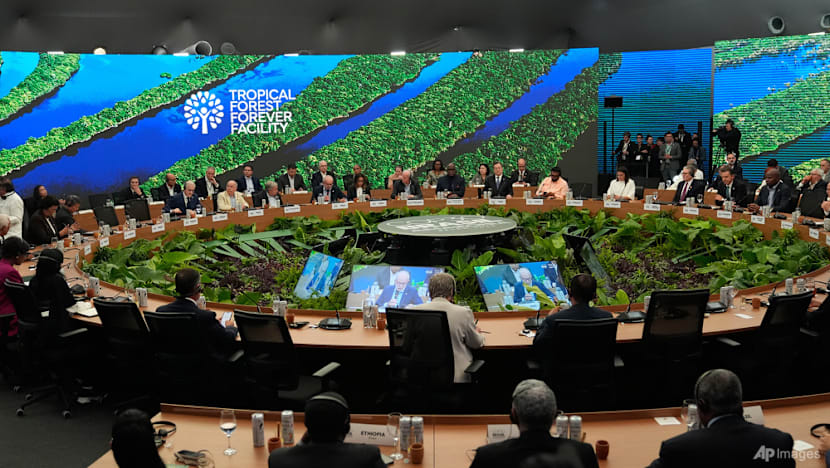Earth cannot 'sustain' intensive fossil fuel use, Lula tells COP30

Brazil's President Luiz Inacio Lula da Silva speaks during a roundtable with leaders of tropical forest countries and nations committed to investing in the Tropical Forest Forever Facility (TFFF) during the COP30 UN Climate Summit in Belem, Brazil, Nov 6, 2025. (Photo: AP/Fernando Llano)
BELEM, Brazil: Brazil's President Luiz Inacio Lula da Silva on Friday (Nov 7) said Earth can no longer sustain humanity's dependence on fossil fuels, and without confronting this reality, the climate fight will be lost.
The leftist leader spoke at a pre-COP30 summit in the Brazilian Amazon, where other heads of state and government implored all nations to start weaning off the burning of coal, oil and gas, responsible for most of the planet-heating pollution.
Evidence of dangerous warming has never been clearer: the decade since the Paris Agreement has been the hottest on record, marked by intensifying hurricanes, heatwaves and wildfires.
Lula said tackling the urgent question over the future of energy would determine "success or failure in the battle against climate change."
"Earth can no longer sustain the development model based on the intensive use of fossil fuels that has prevailed over the past 200 years," Lula told world leaders in Belem, where the UN climate talks are taking place.
It comes two years after the world's nations agreed to "transition away from fossil fuels."
Brazil is hoping for a roadmap towards this goal, but has faced resistance.
Mexico's Environment Secretary Alicia Barcena told AFP that setting a specific date for the elimination of fossil fuels is always problematic because there are still many oil-producing countries.
"It is very difficult to get everyone to agree to eliminate them by 2030, for example. But it can be proposed as a long-term goal," she said.
Lula is presiding over the climate negotiations just weeks after his government approved new oil drilling in the Amazon region.
Rwanda's Environment Minister Bernadette Arakwiye stressed that countries face a stark choice.
"We can continue with incremental progress while the planet burns, or we can rise to meet the scale of this crisis," she said.
LUXURY FLIGHT TAX
A shadow has been cast over the talks by the absence of leaders of the world's biggest polluters – including the United States, whose President Donald Trump has dismissed climate science as a "con job" – but it has also catalysed calls for greater mobilisation.
France, Spain and Kenya are among a group of countries spearheading a drive for a new tax on luxury air travel, rooted in the idea that premium flyers should pay more for their outsized contribution to global warming.
"It is only fair that those who have more and pollute more should pay their fair share," Spanish Prime Minister Pedro Sanchez told the summit.
The initiative is sure to face headwinds from the aviation sector, responsible for about 2.5 per cent of the world's carbon emissions.
ROADMAP SUPPORT
Climate change has slipped down the agenda as nations grapple with economic pressures, trade disputes, wars, and the Trump administration's aggressive push for more fossil fuels.
Brazil has won support for a new fund to save the world's forests, quickly raking in over US$5 billion in pledges to reward tropical countries for not chopping down carbon-absorbing trees.
The world remains off track to keep end-of-century global warming below 1.5 degrees Celsius compared to pre-industrial levels. It is the primary target of the Paris Agreement struck in 2015, and deemed necessary to avert the worst catastrophes of climate destabilisation.
A coalition of hundreds of NGOs representing the interests of women, Indigenous peoples, workers, small-scale farmers and other disadvantaged communities was unimpressed by what world leaders brought to the two-day summit.
"The national plans of rich countries are not talking at all about a commitment they made two years ago ... to move away from this brutal and cannibalistic fossil fuel economy," said Jacobo Ocharan of Climate Action Network International, an NGO network that is part of an alternative so-called People's Summit.
"Nor have we seen absolutely anything regarding climate financing, financing that reaches the populations suffering from this climate crisis," he told reporters in Belem.
UN climate chief Simon Stiell stressed that, 10 years on from the Paris deal, global cooperation was delivering results.
"Without that act of collective courage, we would still be heading for an impossible future of unchecked heating, of up to five degrees," he said.
"Because of it, the curve has bent below 3 degrees Celsius – still perilous, but proof that climate cooperation works."
















